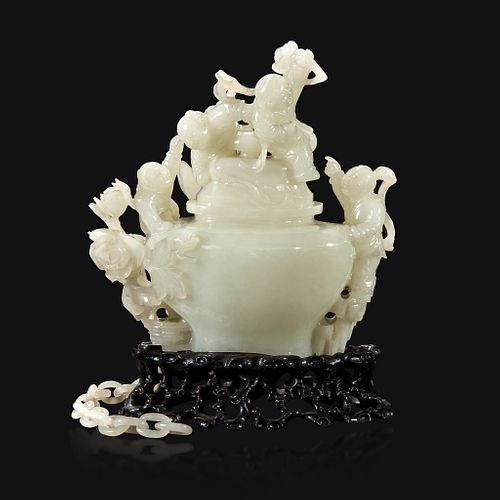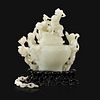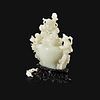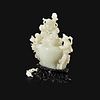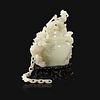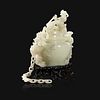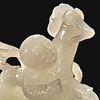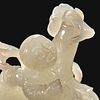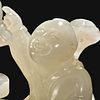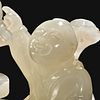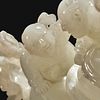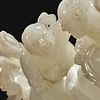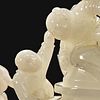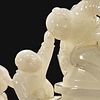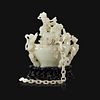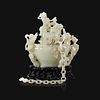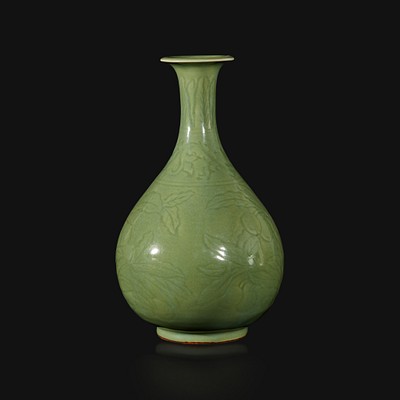A Chinese carved white jade "Boys" vase and cover Qing Dynasty, 18th/early 19th Century
About Seller
2400 Market St
Philadelphia, PA 19147
United States
Established in 1805, Freeman’s Auction House holds tradition close, with a progressive mind-set towards marketing and promotion, along with access to a team of top experts in the auction business. And now with offices in New England, the Southeast, and on the West Coast, it has never been easier to ...Read more
Two ways to bid:
- Leave a max absentee bid and the platform will bid on your behalf up to your maximum bid during the live auction.
- Bid live during the auction and your bids will be submitted real-time to the auctioneer.
Bid Increments
| Price | Bid Increment |
|---|---|
| $0 | $25 |
| $500 | $50 |
| $1,000 | $100 |
| $2,000 | $200 |
| $3,000 | $250 |
| $5,000 | $500 |
| $10,000 | $1,000 |
| $20,000 | $2,000 |
| $30,000 | $2,500 |
| $50,000 | $5,000 |
| $100,000 | $10,000 |
About Auction
Apr 8, 2021
Freeman's upcoming Asian Arts auction includes a selection of fine Chinese porcelains, including a rare Yongzheng 'Dragon and Waves' Meiping and a Longquan Celadon vase. Freeman's info@freemansauction.com
- Lot Description
Of flattened globular form, the vase flanked by two boys at play, with elaborately carved flowers and stems to one broad side and two more boys carved to the cover; a linked chain originally joining the vase and cover joined at one end to a flower stem, the stone of a very even translucent white tone with scattered minor veins and inclusions, with an old ink-inscribed label to the underside and carved wood stand.
(H: 6 1/4 in. (without stand))Provenance: Property formerly in the Collection of Eldridge Reeves Fenimore Johnson (1899-1986)
Thence by descent in the family.
NOTE: E. R. F. Johnson was a noted explorer, yachtsman and researcher. He was a pioneer in the development of underwater photography and had close ties with the University of Pennsylvania, where a collection of his photographs are preserved. His father was Eldridge Reeves Johnson (1867-1945), the founder of the Victor Talking Machine Company, later RCA. It is very possible this may have been originally acquired by the elder E. R. Johnson, given that he gave Chinese works of art to the University of Pennsylvania Museum in 1920 and 1927, including the large crystal ball said to have belonged to the Dowager Empress Cixi, the pair of carved stone reliefs of the favorite horses of the Tang Emperor Taizong, and numerous jade and coral carvings.
NOTE: The motif of boys clambering over the surface of vases was particularly popular during the Qianlong and following periods, with examples known in porcelain and jade. The treatment of boys in combination with fully blown flowers, likely peonies, is unusual.
The treatment of the flowers is similar to pieced censers and covers dating to the Qianlong period, such as the example from the Qing Court Collections in the Palace Museum, Beijing, illustrated in, "Zhongguo Yu Qi Quan Ji", Hebei, 1997, Vol. 6, no. 80. See also the 18th century example illustrated in Roger Keverne et al, "Jade", London, 1991, p. 176, no. 122, and the 18th century example, formerly in the collection of the Baltimore Museum of Art, illustrated in Robert Kleiner, "Chinese Jades from the Collection of Alan and Simone Hartman", Hong Kong 1996. The use of the peony, together with playful boys and the vase (a rebus for "Peace"), connote wishes for wealth, honor, nobility and prosperity.
For other examples of 18th century white jade "Boys and Vases" groups, see the white jade vase of pomegranate-form with three boys, sold at Sotheby's London, May 15, 2013, lot 56. See also a "Hehe Erxian vase, 4 1/4" high, sold at Sotheby's London, May 11, 2016, lot 104, and a 6" high vase with two boys, sold Christie's London, November 7, 2016, lot 170. - Shipping Info
-
No lot may be removed from Freeman’s premises until the buyer has paid in full the purchase price therefor including Buyer’s Premium or has satisfied such terms that Freeman’s, in its sole discretion, shall require. Subject to the foregoing, all Property shall be paid for and removed by the buyer at his/ her expense within ten (10) days of sale and, if not so removed, may be sold by Freeman’s, or sent by Freeman’s to a third-party storage facility, at the sole risk and charge of the buyer(s), and Freeman’s may prohibit the buyer from participating, directly or indirectly, as a bidder or buyer in any future sale or sales. In addition to other remedies available to Freeman’s by law, Freeman’s reserves the right to impose a late charge of 1.5% per month of the total purchase price on any balance remaining ten (10) days after the day of sale. If Property is not removed by the buyer within ten (10) days, a handling charge of 2% of the total purchase price per month from the tenth day after the sale until removal by the buyer shall be payable to Freeman’s by the buyer. Freeman’s will not be responsible for any loss, damage, theft, or otherwise responsible for any goods left in Freeman’s possession after ten (10) days. If the foregoing conditions or any applicable provisions of law are not complied with, in addition to other remedies available to Freeman’s and the Consignor (including without limitation the right to hold the buyer(s) liable for the bid price) Freeman’s, at its option, may either cancel the sale, retaining as liquidated damages all payments made by the buyer(s), or resell the property. In such event, the buyer(s) shall remain liable for any deficiency in the original purchase price and will also be responsible for all costs, including warehousing, the expense of the ultimate sale, and Freeman’s commission at its regular rates together with all related and incidental charges, including legal fees. Payment is a precondition to removal. Payment shall be by cash, certified check or similar bank draft, or any other method approved by Freeman’s. Checks will not be deemed to constitute payment until cleared. Any exceptions must be made upon Freeman’s written approval of credit prior to sale. In addition, a defaulting buyer will be deemed to have granted and assigned to Freeman’s, a continuing security interest of first priority in any property or money of, or owing to such buyer in Freeman’s possession, and Freeman’s may retain and apply such property or money as collateral security for the obligations due to Freeman’s. Freeman’s shall have all of the rights accorded a secured party under the Pennsylvania Uniform Commercial Code.
-
- Buyer's Premium



 EUR
EUR CAD
CAD AUD
AUD GBP
GBP MXN
MXN HKD
HKD CNY
CNY MYR
MYR SEK
SEK SGD
SGD CHF
CHF THB
THB